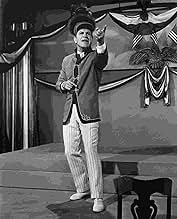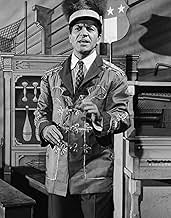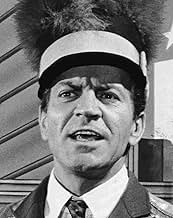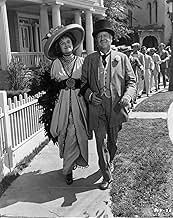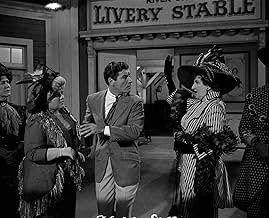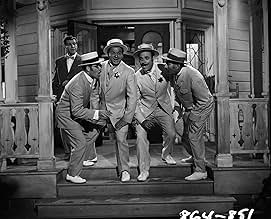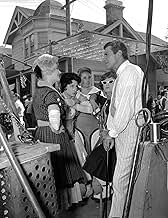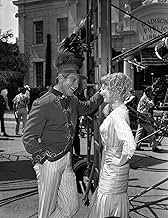PUNTUACIÓN EN IMDb
7,7/10
20 mil
TU PUNTUACIÓN
Harold Hill se hace pasar por el líder de una banda de chicos para engañar a la gente del pueblo de Iowa.Harold Hill se hace pasar por el líder de una banda de chicos para engañar a la gente del pueblo de Iowa.Harold Hill se hace pasar por el líder de una banda de chicos para engañar a la gente del pueblo de Iowa.
- Dirección
- Guión
- Reparto principal
- Ganó 1 premio Óscar
- 6 premios y 12 nominaciones en total
Vern Reed
- Jacey Squires
- (as The Buffalo Bills)
Ron Howard
- Winthrop Paroo
- (as Ronny Howard)
Al Shea
- Ewart Dunlop
- (as The Buffalo Bills)
Bill Spangenberg
- Olin Britt
- (as The Buffalo Bills)
Wayne Ward
- Oliver Hix
- (as The Buffalo Bills)
Reseñas destacadas
It seems redundant to add my comments when so many people have already done justice to it, but I'm still in the glow of having finally seen this movie as God intended--in Cinemascope! When I saw it long ago on TV, I was struck by how unusual it was but kept noticing certain distracting bits around the edge of the screen--it was the fade-outs and split-screen effects I was missing! Watch this film in letterboxed form ONLY please--it's visually, musically and dramatically innovative.
Its splendors have already been mentioned. I add two minor treats: 1) appearance of lanky character actor Hank Worden (of "The Searchers" and "Twin Peaks") as the undertaker, and 2) script so full of bizarre slang and expressions, it's as if P.G. Wodehouse or Damon Runyan were writing turn-of-the-century Americana.
My two carps are minor: I would have told Morton Da Costa to lose all the heavy-handed cutaways to the train wheels ("Rock Island") and chickens ("Pick a Little, Talk a Little") because we already got the point, and Ron Howard's cute lithp is a turn-off for me, but I never like cute kids. However, he's good at the climax, and when Shirley Jones hears him singing "Wells Fargo Wagon" and tears the evidence against Harold Hill out of the book (a librarian!), it's one of the most convincing turnarounds in musical history. Especially because she's still not fooled by the hucksterism, she just perceives it differently in comparison with the easily manipulated small-towners around her. She realizes that he's selling hope and joy despite himself ("There's always a band.") And when she just thanks him for his gift ("Till There Was You") and doesn't mind if he flees, of course he realizes he would be insane to leave. Another heartfelt turnaround.
One of the most graceful musicals, marked by blurring of the line between straight dialogue and songs--as the line "there was love all around but I never heard it singing" implies, you can hear the singing if you listen for it in the world. It's in the trains and the chickens and the bands you hear in your head and the pride in your children playing that clarinet by the "think system." Moving.
Its splendors have already been mentioned. I add two minor treats: 1) appearance of lanky character actor Hank Worden (of "The Searchers" and "Twin Peaks") as the undertaker, and 2) script so full of bizarre slang and expressions, it's as if P.G. Wodehouse or Damon Runyan were writing turn-of-the-century Americana.
My two carps are minor: I would have told Morton Da Costa to lose all the heavy-handed cutaways to the train wheels ("Rock Island") and chickens ("Pick a Little, Talk a Little") because we already got the point, and Ron Howard's cute lithp is a turn-off for me, but I never like cute kids. However, he's good at the climax, and when Shirley Jones hears him singing "Wells Fargo Wagon" and tears the evidence against Harold Hill out of the book (a librarian!), it's one of the most convincing turnarounds in musical history. Especially because she's still not fooled by the hucksterism, she just perceives it differently in comparison with the easily manipulated small-towners around her. She realizes that he's selling hope and joy despite himself ("There's always a band.") And when she just thanks him for his gift ("Till There Was You") and doesn't mind if he flees, of course he realizes he would be insane to leave. Another heartfelt turnaround.
One of the most graceful musicals, marked by blurring of the line between straight dialogue and songs--as the line "there was love all around but I never heard it singing" implies, you can hear the singing if you listen for it in the world. It's in the trains and the chickens and the bands you hear in your head and the pride in your children playing that clarinet by the "think system." Moving.
This was a very difficult musical, I suspect, for Morton da Costa to direct. To his great credit, it never looks to me like a stage musical; taking his cue from a few famous examples of adaptations done on non-musical films, he has used the entire River City, Iowa, USA town as his stage, moving his mobile cameras wherever the action could best be served. But I suggest "The Music Man" is most important not for its entertainment qualities, which are considerable perhaps, but for its importance as a fantasy-for-the-sake-of-an-idea plot. Without it, we might never have had "Finian's Rainbow", "Chicago" or "City of Angels" for instance. Hollywood's studio tsars, despite their surrealized applying of pseudo-Christian endings to plots, were always very cautious about introducing any "fantasy" element into a film. (Note the lengthy apologia by David Selznick for "Portrait of Jenny", for instance.) In this story, Meredith Wilson used his personal knowledge of the people and ways-of-thinking of Iowa to ground a charming and genial fantasy about music-course salesman Harold Hill firmly within its milieu--one of a group of U.S minds in need of more imagination. The town's kindly folk, in fact, are shown as barely tolerant toward its librarian, who inherited the institution from its elderly compiler; they are suspicious of how Marian Paroo acquired the stock, and suspicious of her desire to teach their young minds to think for themselves. Enter Professor Hill--to change the lives of the almost charming but repressed early twentieth-century denizens forever. The basic plot is very simple to state. Professor Hill comes to towns, sells the town's citizens on the idea of starting a boy's band, and then skips out before they can ever perform. Here, he is brought to the point of leading his troops, trained by his "think system", in a concert; and the townsfolk are enthralled by hearing their sons play. This simple tale starred Robert Preston as the wily city-bred Hill, Shirley
Jones as the lovely but doubting 'Marian the Librarian', Pert Kelton as her mother, Buddy Hackett as his fine friend, Paul Ford and Hermione Gingold as the pretentious Mayor and his wife, plus many citizens of the town young and old, Harry Hickox as the envious rival who exposes Hill and the Buffalo Bills singing quartet. Well-known songs in this sprightly US romp include, "Till There Was You", "Somethin' Special", "Goodnight My Someone", "Marian the Librarian" and "Trouble", among others. In the film, the leads are award caliber, everyone else from Ronnie Howard to Susan Luckey to the quartet do very well. Marion Hargrove adapted Wilson's libretto and songs written by Wilson and Franklin Lacey. The cinematography by Robert Burks was vivid and stylishly old-fashioned. Paul Groesse did the art direction, with set decorations being supplied by George James Hopkins and his staff. The very elaborate costumes were the work of the brilliant designer Dorothy Jeakins. This is a sense of life film written by, about and for non-practicing Christians of the last century that was mounted somehow in 1962, as an homage to a simpler and more optimistic time. We can all be grateful it was; it is a great deal of fun and its ending is a happy part of the fantasy, which needs to be seen to be appreciated.
Jones as the lovely but doubting 'Marian the Librarian', Pert Kelton as her mother, Buddy Hackett as his fine friend, Paul Ford and Hermione Gingold as the pretentious Mayor and his wife, plus many citizens of the town young and old, Harry Hickox as the envious rival who exposes Hill and the Buffalo Bills singing quartet. Well-known songs in this sprightly US romp include, "Till There Was You", "Somethin' Special", "Goodnight My Someone", "Marian the Librarian" and "Trouble", among others. In the film, the leads are award caliber, everyone else from Ronnie Howard to Susan Luckey to the quartet do very well. Marion Hargrove adapted Wilson's libretto and songs written by Wilson and Franklin Lacey. The cinematography by Robert Burks was vivid and stylishly old-fashioned. Paul Groesse did the art direction, with set decorations being supplied by George James Hopkins and his staff. The very elaborate costumes were the work of the brilliant designer Dorothy Jeakins. This is a sense of life film written by, about and for non-practicing Christians of the last century that was mounted somehow in 1962, as an homage to a simpler and more optimistic time. We can all be grateful it was; it is a great deal of fun and its ending is a happy part of the fantasy, which needs to be seen to be appreciated.
I first learned of the Music Man when my brother's fifth grade class put it on. (My brother played Mayor Shinn.) Our entire family learned the train scene, all of the monologues (especially "Trouble"), and the Music Man became part of our lives. I still remember most of those monologues, and I still love to watch Robert Preston and Shirley Jones create their magic and make their music. Like "My Fair Lady," the players have refined their parts to high art, but have not burned out; the details delight again and again. The chorus is the best I've heard (Wells Fargo Wagon), the cast is just great. When my older son was two years old, The Music Man was his favorite video; he watched it over and over, laughing and gurgling. He "outgrew" it, and is now almost ten. Last night we watched it (again): I, my wife, and both of our sons. It touched me as much as the first time I saw it. ("I always think there's a band, kid.") I hear and read criticism of Robert Preston's acting, that as a performer he is a dilettante. But I feel this criticism misses the point. Harold Hill is the dilettante, trying to pass himself off as a music expert--until he gets his foot caught in the door. Preston is perfect as Hill. I love this film, and will watch it with my loved ones for a long, long time to come.
This wonderful production has to be watched on the big screen to be fully appreciated. It is,in my opinion, the best translation from Broadway musical theater material to the opening-up on the screen. The performance and general character portrayal of Robert Preston is irresistible and a joy to watch. As far as musicals are concerned, this is the one to take along to your desert island! Í always look forward to the next opportunity there is to show it on the screen of my cinema again. Sentimental, nostalgic, funny and romantic, this picture has it all. And that includes the wonderful melodic songs and the fantastic choreography. I'm running out of superlatives. It's my favorite musical.
bright, fun, colorful, unforgettable songs, likeable characters, great choreography, true to the time period, and i'd like to see anyone try to find an actor blend so naturally into a character as robert preston.
¿Sabías que...?
- CuriosidadesThe two songs "76 Trombones" and "Good Night My Someone" are the same tune, played in different tempos. Meredith Willson used this technique to present a masculine and feminine slant on the events surrounding Harold Hill's arrival in River City and his budding relationship with Marian.
- PifiasAs Harold makes his very first walk down Main Street after getting off the train, the hills in the background are at the far eastern end of the Santa Monica Mountains. Iowa is famously flat.
- Citas
Marian Paroo: No, please, not tonight. Maybe tomorrow.
Harold Hill: Oh, my dear little librarian. You pile up enough tomorrows, and you'll find you've collected nothing but a lot of empty yesterdays. I don't know about you, but I'd like to make today worth remembering.
Marian Paroo: Oh, so would I.
- Créditos adicionalesThe closing credits appear in the style of a Broadway show's curtain call. First the minor characters are shown with the performers' names. The credits then progress through the cast ending with the lead.
- Banda sonoraMain Title
(1957) (uncredited)
Music and Lyrics by Meredith Willson
Performed by Ray Heindorf and the Warner Bros. Studio Orchestra
Selecciones populares
Inicia sesión para calificar y añadir a tu lista para recibir recomendaciones personalizadas
Detalles
- Fecha de lanzamiento
- País de origen
- Idioma
- Títulos en diferentes países
- Vendedor de ilusiones
- Localizaciones del rodaje
- Empresa productora
- Ver más compañías en los créditos en IMDbPro
Taquilla
- Presupuesto
- 4.240.000 US$ (estimación)
- Duración
- 2h 31min(151 min)
- Color
- Relación de aspecto
- 2.35 : 1
Contribuir a esta página
Sugerir un cambio o añadir el contenido que falta


